 |
|
Hi, you're in the Archives, February 2007 - Part 1 |
|
|
|
|
 |
| |
February
14, 2007 |
|
 |
| TASTING
- SEVEN GREAT OLD GLEN GARIOCHS for
Valentine's Day - pffff... |
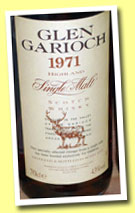 |
Glen
Garioch 1971 (43%, OB for Oddbins,
mid-1990’s)
 If this ones comes anywhere near the
legendary 1971 ‘Duthie’s
for Samaroli… Colour: pale gold.
Nose: fantastically complex right
at first nosing, one of the greatest
‘Glen Geeries’ it seems.
Starts with loads of pink grapefruit
and passion fruit plus crushed mint
leaves and hints of dry sherry. Very
vinous, superbly so, whiffs of high-end
wine barrel (not the Ikea versions
they usually use in the whisky industry).
The peat is bold and fat, yet sort
of ethereal… This is a masterpiece
on the nose. Goes on with tobacco,
leather, soy sauce and balsamic vinegar…
Truly fabulous. Keeps going on with
camphor this time, oyster sauce, eucalyptus…
This is why we’re into whisky!
If this ones comes anywhere near the
legendary 1971 ‘Duthie’s
for Samaroli… Colour: pale gold.
Nose: fantastically complex right
at first nosing, one of the greatest
‘Glen Geeries’ it seems.
Starts with loads of pink grapefruit
and passion fruit plus crushed mint
leaves and hints of dry sherry. Very
vinous, superbly so, whiffs of high-end
wine barrel (not the Ikea versions
they usually use in the whisky industry).
The peat is bold and fat, yet sort
of ethereal… This is a masterpiece
on the nose. Goes on with tobacco,
leather, soy sauce and balsamic vinegar…
Truly fabulous. Keeps going on with
camphor this time, oyster sauce, eucalyptus…
This is why we’re into whisky!
|
| Mouth:
starts slightly weakish for a fraction
of a second but a flavourful maelstrom
is soon to explode. You have a superb
peat (certainly bolder than in most
Glen Gariochs from the 1960’s)
as well as smoked fish, smoked tea,
bags of spices (cloves, cardamom and
the likes)… Maybe it’s
just a tad cardboardy but certainly
nothing to complain about. Goes on
with Seville oranges and triple-sec,
what a fabulous whisky. Finish: medium
long but superbly bitter now, on bitter
chocolate, mustard and also well hung
game and wild mushrooms (morels).
Exceptional, legendary whisky bottled
at 43% that has enough aromas and
flavours to taste like a 50% malt.
95 points (I have
the Samaroli at 96 points but it was
bottled at 100°proof). |
Glen
Garioch 31 yo 1967/1998 (46%, Kingsbury,
cask #663)  Colour: straw. Nose: simpler and different
– but note that its hard to
come right after a stunner –
although the start is most pleasant,
on citrus fruits, gingerbread and
soaked grains. Notes of old roses
and orange juice, much, much less
peat than in the 1971 for Oddbins
but it’s kind of fresher. Nice
notes of orange cake and vanilla,
getting then a little sharper (rubbed
orange skin). Mouth: rounder and certainly
more jammy and fruity than the 1971.
Very nice in fact but it doesn’t
hold a candle to the latter. Gets
grainier, porridgy, still very orangey.
Gets then more tannic and dry, with
also black nougat and plum spirit
(‘clean’ slivovitz). Very
little peat. Finish: long (longer
than the 1971’s) but rougher
now, more drying, hotter than the
OB. A very good whisky but it suffers
from the comparison. We’ll try
to have it again within a less ‘elevated’
line-up one day. 86 points.
Colour: straw. Nose: simpler and different
– but note that its hard to
come right after a stunner –
although the start is most pleasant,
on citrus fruits, gingerbread and
soaked grains. Notes of old roses
and orange juice, much, much less
peat than in the 1971 for Oddbins
but it’s kind of fresher. Nice
notes of orange cake and vanilla,
getting then a little sharper (rubbed
orange skin). Mouth: rounder and certainly
more jammy and fruity than the 1971.
Very nice in fact but it doesn’t
hold a candle to the latter. Gets
grainier, porridgy, still very orangey.
Gets then more tannic and dry, with
also black nougat and plum spirit
(‘clean’ slivovitz). Very
little peat. Finish: long (longer
than the 1971’s) but rougher
now, more drying, hotter than the
OB. A very good whisky but it suffers
from the comparison. We’ll try
to have it again within a less ‘elevated’
line-up one day. 86 points. |
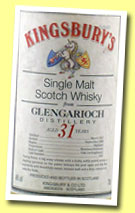 |
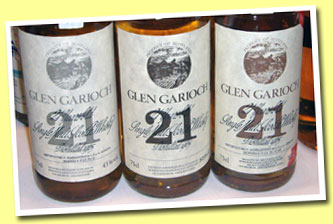 |
Now
a very
interesting and famous series of
21 yo 1965’s at three different
strength: 43, 50 (100 US proof)
and 57% (100 UK proof)... |
Glen
Garioch 21 yo 1965 (43%, OB, circa
1986)  Already had this one and loved it.
Colour: straw. Nose: again, les peaty
and bold than the 1971, also more
austere and mineral, flinty. Less
sexy but perhaps more elegant, sharp
and aromatically ‘precise’.
Notes of linseed oil, motor oil, getting
more and more flinty. More peat arises
as well as camphor and lots of ashes
(matchsticks, fireplace, coal oven).
Also wet hay, eucalyptus, metal polish…
Excellent and full of personality.
Mouth: now sweeter than the 1971,
more liquoricy and minty. Develops
on tea and oranges, chamomile, peat,
cough sweets… Truly excellent,
rather smooth. The balance is perfect
and so is the finish, even if it isn’t
too bold. Complex. Another amazing
Glen Garioch but the 1971 is even
more multidimensional. 93
points.
Already had this one and loved it.
Colour: straw. Nose: again, les peaty
and bold than the 1971, also more
austere and mineral, flinty. Less
sexy but perhaps more elegant, sharp
and aromatically ‘precise’.
Notes of linseed oil, motor oil, getting
more and more flinty. More peat arises
as well as camphor and lots of ashes
(matchsticks, fireplace, coal oven).
Also wet hay, eucalyptus, metal polish…
Excellent and full of personality.
Mouth: now sweeter than the 1971,
more liquoricy and minty. Develops
on tea and oranges, chamomile, peat,
cough sweets… Truly excellent,
rather smooth. The balance is perfect
and so is the finish, even if it isn’t
too bold. Complex. Another amazing
Glen Garioch but the 1971 is even
more multidimensional. 93
points. |
Glen
Garioch 21 yo 1965 (50%, OB, circa
1986)  With a red stripe mentioning ‘Full
proof’ just like on some Bowmores
from the same era. Colour: straw.
Nose: very close to the 43% but even
more austere at first nosing, sharp,
maybe more vegetal. Superb notes of
camphor, embrocations, tiger balm.
A little less complexity, it’s
also less ‘talkative’
on the nose. Mouth: ah, this is even
nicer now. Assertive, powerful, maybe
slightly less ‘defined’
and a tad dirtier (as if there was
a dirty cask within the vatting, says
co-taster Olivier) but also spicier,
more peppery, minty. Something slightly
metallic (but its a cork stopper),
notes of chlorophyll, a little more
bitter. The finish is long but a little
heavy, maybe a tad ‘vulgar’.
Really splitting hairs here, it’s
still fabulous whisky. 91
points.
With a red stripe mentioning ‘Full
proof’ just like on some Bowmores
from the same era. Colour: straw.
Nose: very close to the 43% but even
more austere at first nosing, sharp,
maybe more vegetal. Superb notes of
camphor, embrocations, tiger balm.
A little less complexity, it’s
also less ‘talkative’
on the nose. Mouth: ah, this is even
nicer now. Assertive, powerful, maybe
slightly less ‘defined’
and a tad dirtier (as if there was
a dirty cask within the vatting, says
co-taster Olivier) but also spicier,
more peppery, minty. Something slightly
metallic (but its a cork stopper),
notes of chlorophyll, a little more
bitter. The finish is long but a little
heavy, maybe a tad ‘vulgar’.
Really splitting hairs here, it’s
still fabulous whisky. 91
points. |
Glen
Garioch 21 yo 1965 (57%, OB, circa
1986)  Colour: straw. Nose: hotter of course
but certainly not less interesting
– and thrilling. Much more on
wild mushrooms, flints and eucalyptus/camphor
(Vicks). Lots of mint as well. Gets
even wilder after a while, with notes
of wet dog and farmyard, metal, peppermint.
Extremely persistent, even dominating.
A beast. Mouth: more powerful this
time again, even more austere and
dry but hugely coherent and compact,
sharp like a blade. Lots of mint,
liquorice, rhubarb (yes), lots of
blck pepper, cardamom, even chilli,
peppermint liqueur, roots… A
true beast indeed. An exceptional
whisky, even if maybe less drinkable
than the 43% version and a tad more
tiring. The finish is endless this
time. If you like sharpness you’ll
agree with my 94 points.
Colour: straw. Nose: hotter of course
but certainly not less interesting
– and thrilling. Much more on
wild mushrooms, flints and eucalyptus/camphor
(Vicks). Lots of mint as well. Gets
even wilder after a while, with notes
of wet dog and farmyard, metal, peppermint.
Extremely persistent, even dominating.
A beast. Mouth: more powerful this
time again, even more austere and
dry but hugely coherent and compact,
sharp like a blade. Lots of mint,
liquorice, rhubarb (yes), lots of
blck pepper, cardamom, even chilli,
peppermint liqueur, roots… A
true beast indeed. An exceptional
whisky, even if maybe less drinkable
than the 43% version and a tad more
tiring. The finish is endless this
time. If you like sharpness you’ll
agree with my 94 points. |
Glen
Garioch 29 yo 1968 (53.7%, OB, hogshead
#627, 1997)  Colour: dark amber. Nose: lots of
sherry now, starting on full nougat,
caramel and chocolate as well as Smyrna
raisins and wax polish. Quite some
peat and meat. Develops on well hung
game, bilberry sauce and cooked apples,
high-end wine barrel, old rum, mullein
cordial… Very rounded and sweet
but nervous as well. Goes on with
bananas flambéed and pina colada.
Easy and… Creole indeed. Gets
then meatier and meatier, with also
quite some meat sauce. Very nice wood
and but also strange hints of Parmesan
cheese. Really playful. Mouth: vibrant
and playful indeed but much more peppery
now besides the sherry. Lots of fruits,
fruit liqueurs and quite some wood,
making it a little drying now and
kind of bitterish. Lacks a little
extra-complexity, I’d say, but
it’s very enjoyable (and thick).
Finish: long, dry, full-sherried,
on coffee, pepper and a little mint.
Very good but not totally stunning.
It was probably a sherry hogshead.
88 points.
Colour: dark amber. Nose: lots of
sherry now, starting on full nougat,
caramel and chocolate as well as Smyrna
raisins and wax polish. Quite some
peat and meat. Develops on well hung
game, bilberry sauce and cooked apples,
high-end wine barrel, old rum, mullein
cordial… Very rounded and sweet
but nervous as well. Goes on with
bananas flambéed and pina colada.
Easy and… Creole indeed. Gets
then meatier and meatier, with also
quite some meat sauce. Very nice wood
and but also strange hints of Parmesan
cheese. Really playful. Mouth: vibrant
and playful indeed but much more peppery
now besides the sherry. Lots of fruits,
fruit liqueurs and quite some wood,
making it a little drying now and
kind of bitterish. Lacks a little
extra-complexity, I’d say, but
it’s very enjoyable (and thick).
Finish: long, dry, full-sherried,
on coffee, pepper and a little mint.
Very good but not totally stunning.
It was probably a sherry hogshead.
88 points. |
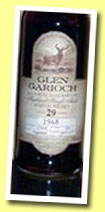 |
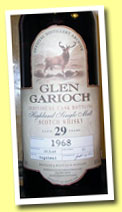 |
Glen
Garioch 29 yo 1968 (56.5%, OB for Bill
& Maggie Miller, hogshead #13)
 Colour: amber. Nose: just superb at
first nosing, more austere and dry
than cask #627 but also more elegant,
more complex. Lots of bitter chocolate
and coffee plus mint and then we have
truckloads of coconuts, almond paste
and macaroons. Resembles some of the
greatest new style rums (Savanna),
with a perfect balance. There’s
a little less peat than in cask #627
but more mint and more nice fresh
wood. Great. Mouth: thicker, fruitier
and more assertive. Lots of apricot
jam, ripe mirabelle plums, less tannins
and wood. Develops on nougat, Irish
coffee, then hints of horseradish
and pepper, a little peat… Maybe
not overly complex but the balance
is perfect. Finish: long, now rather
woodier and tannic, maybe the less
distinctive part but the whole is
another excellent old Glen Garioch.
90 points, well deserved.
Colour: amber. Nose: just superb at
first nosing, more austere and dry
than cask #627 but also more elegant,
more complex. Lots of bitter chocolate
and coffee plus mint and then we have
truckloads of coconuts, almond paste
and macaroons. Resembles some of the
greatest new style rums (Savanna),
with a perfect balance. There’s
a little less peat than in cask #627
but more mint and more nice fresh
wood. Great. Mouth: thicker, fruitier
and more assertive. Lots of apricot
jam, ripe mirabelle plums, less tannins
and wood. Develops on nougat, Irish
coffee, then hints of horseradish
and pepper, a little peat… Maybe
not overly complex but the balance
is perfect. Finish: long, now rather
woodier and tannic, maybe the less
distinctive part but the whole is
another excellent old Glen Garioch.
90 points, well deserved. |
MUSIC
– Recommended
listening: an amazing hard funk
funk made by Betty
Davis in 1975. Betty
was... Miles' wife! It's also said
she had an affair with Jimi Hendrix.
This piece is simply called F-U-N-K.mp3. |
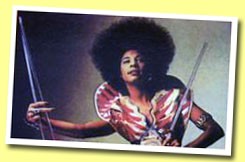 |
| |
February
13, 2007 |
|
 |
| TASTING
- SEVEN OLD HIGHLAND PARKS |
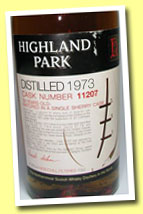 |
Highland
Park 30 yo 1973 (47.8%, OB, Matthew
Forrest Collection, sherry cask #11207,
520 bottles)  Colour: gold. Nose: starts on full
fruit mode, with lots of banana and
lychee. Then we have heather, light
honey, nectar, pollen, ripe apricots…
Maybe not the most complex HP ever,
not the most powerful but it’s
rather elegant. Hints of fresh mint
and yoghurt as well as orange juice.
A little nutmeg and soy sauce…
Maybe a little restrained. Mouth:
much nicer. Elegant and assertive,
with lots of caramel, praline and
honey plus dried figs nd dates. Very
pleasant, with a nice woodiness. Lacks
a little magic considering its age
and pedigree, that is. Finish: medium
long, with a little peat and pepper
plus notes of orange marmalade. A
highly drinkable old Highland Park.
88 points.
Colour: gold. Nose: starts on full
fruit mode, with lots of banana and
lychee. Then we have heather, light
honey, nectar, pollen, ripe apricots…
Maybe not the most complex HP ever,
not the most powerful but it’s
rather elegant. Hints of fresh mint
and yoghurt as well as orange juice.
A little nutmeg and soy sauce…
Maybe a little restrained. Mouth:
much nicer. Elegant and assertive,
with lots of caramel, praline and
honey plus dried figs nd dates. Very
pleasant, with a nice woodiness. Lacks
a little magic considering its age
and pedigree, that is. Finish: medium
long, with a little peat and pepper
plus notes of orange marmalade. A
highly drinkable old Highland Park.
88 points. |
Highland
Park 1975/1994 (51.9%, Signatory for
the Scotch Malt Embassy, cask #4279)
 Colour: pale straw. Nose: this one
starts much more on nutmeg, cloves
and vanilla crème, new books,
with hints of tar and rubber (new
tyre). Gets then more minty, with
also eucalyptus. Rather classic –
and classy. Also hints of porridge,
getting marginally mashier with time.
Mouth: rather full bodied, spicier
than the 1973. Sharper, almost aggressive.
Lots of crystallised oranges, bitter
oranges, a little Campari, ginger,
eucalyptus sweets, eucalyptus honey…
Not more complex than the 1973 but
just as drinkable, a hipflask Highland
Park? Long finish on strong honey
and dried oranges. More direct and
powerful than the 1973 but finally
a little less elegant and balanced…
Same rating, 88 points.
Colour: pale straw. Nose: this one
starts much more on nutmeg, cloves
and vanilla crème, new books,
with hints of tar and rubber (new
tyre). Gets then more minty, with
also eucalyptus. Rather classic –
and classy. Also hints of porridge,
getting marginally mashier with time.
Mouth: rather full bodied, spicier
than the 1973. Sharper, almost aggressive.
Lots of crystallised oranges, bitter
oranges, a little Campari, ginger,
eucalyptus sweets, eucalyptus honey…
Not more complex than the 1973 but
just as drinkable, a hipflask Highland
Park? Long finish on strong honey
and dried oranges. More direct and
powerful than the 1973 but finally
a little less elegant and balanced…
Same rating, 88 points. |
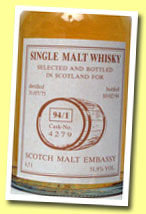 |
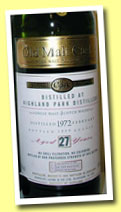 |
Highland
Park 27 yo 1972/1999 (50%, Douglas
Laing OMC, 324 bottles)
 Colour: gold. Nose: starts a little
grainy and caramelly and develops
boldly on cafe latte and dried longans
and dates. It’s also very ‘toasted’
(toasted brioche and bread). Something
nicely sour in the background. Goes
on with cooked apples and Bailey’s
(or Alexandra, the cocktail, eh.)
Like caramel crème with whisky.
Mouth: sweet, fruity and very honeyed.
A little rubber, maybe hints of sulphur.
Lots of sultanas, roasted raisins
and caramel again. Also dried bananas.
Finish: rather long but not too precise
this time. Caramel and cooked apples,
getting a little tannic and drying.
Good but no winning old HP I think.
85 points.
Colour: gold. Nose: starts a little
grainy and caramelly and develops
boldly on cafe latte and dried longans
and dates. It’s also very ‘toasted’
(toasted brioche and bread). Something
nicely sour in the background. Goes
on with cooked apples and Bailey’s
(or Alexandra, the cocktail, eh.)
Like caramel crème with whisky.
Mouth: sweet, fruity and very honeyed.
A little rubber, maybe hints of sulphur.
Lots of sultanas, roasted raisins
and caramel again. Also dried bananas.
Finish: rather long but not too precise
this time. Caramel and cooked apples,
getting a little tannic and drying.
Good but no winning old HP I think.
85 points. |
Highland
Park 18 yo 1972/1991 (56%, Signatory,
cask #9017, 600 bottles)
 Colour: amber. Nose: this one is more
on sherry but we do have the dried
longans again as well as quite some
smoke and caramel crème, just
like with the DL. Goes on with nougat,
honey sauce (spare ribs), sultanas…
More and more smoke, quite some peat
and coal. Classy nose! Mouth: more
personality and more oomph than its
sibling from 1972. Lots of dried fruits
(mostly bananas and figs), peat, strong
honey… It’s a great cask,
for sure. Lots of raisins of various
kinds and an excellent sherry. Finish:
long, balanced as well as ‘bold’,
really on dried fruits. In short,
not stunning but truly excellent,
88 points.
Colour: amber. Nose: this one is more
on sherry but we do have the dried
longans again as well as quite some
smoke and caramel crème, just
like with the DL. Goes on with nougat,
honey sauce (spare ribs), sultanas…
More and more smoke, quite some peat
and coal. Classy nose! Mouth: more
personality and more oomph than its
sibling from 1972. Lots of dried fruits
(mostly bananas and figs), peat, strong
honey… It’s a great cask,
for sure. Lots of raisins of various
kinds and an excellent sherry. Finish:
long, balanced as well as ‘bold’,
really on dried fruits. In short,
not stunning but truly excellent,
88 points. |
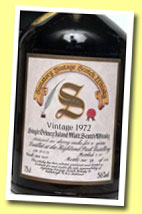 |
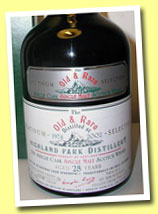 |
Highland
Park 28 yo 1974/2002 (56.8%, Douglas
Laing Platinum, 226 bottles)
 Colour: straw. Nose: fresher, lighter
and more mineral, floral and ashy.
Soon to get a little milky and mashy
(porridge, yoghurt). I think the OMC
is nicer. This one gets farmy after
a moment, grassy (infused tealeaves),
with quite some tannins and green
tea. We have more peat after at the
‘end of the nose’. Mouth:
wilder, peatier than both 1972’s,
more on herbs (thyme) and all kinds
of burnt ‘stuff’. A little
hot I must say. Goes on with walnut
liqueur, orange marmalade and strong
honey. Finish: long and very honeyed
but a little indefinite, with hints
of rubber… Well, maybe this
one’s a little boring, like
most ‘average’ old Highland
Parks, but of course it’s very
drinkable whisky. I liked the OMC
a little better. 84 points.
Colour: straw. Nose: fresher, lighter
and more mineral, floral and ashy.
Soon to get a little milky and mashy
(porridge, yoghurt). I think the OMC
is nicer. This one gets farmy after
a moment, grassy (infused tealeaves),
with quite some tannins and green
tea. We have more peat after at the
‘end of the nose’. Mouth:
wilder, peatier than both 1972’s,
more on herbs (thyme) and all kinds
of burnt ‘stuff’. A little
hot I must say. Goes on with walnut
liqueur, orange marmalade and strong
honey. Finish: long and very honeyed
but a little indefinite, with hints
of rubber… Well, maybe this
one’s a little boring, like
most ‘average’ old Highland
Parks, but of course it’s very
drinkable whisky. I liked the OMC
a little better. 84 points. |
Highland
Park 1959/1991 (57.6%, Gordon &
MacPhail ‘Cask’, cask
#598)  From a mini, never saw this one as
a full bottle, neither did Mr. HP
(Olivier). - March 7 correction:
a friend from the US has got some
full bottles - Colour: gold.
Nose: an amazing start on lemon and
vanilla (make that lemon meringue)
with notes of tobacco smoke and lilac
and hints of aniseed, parsley and
dill. Add to that notes of smoked
fish and you get an unusual and very
interesting combination. There’s
also quite some sage, lovage, something
slightly cardboardy (perfectly okay),
poultry bouillon, oxtail… Well,
it’s maybe not the cleanest
old HP ever but there’s lots
happening, it’s very entertaining.
Mouth: much less powerful than on
the nose, very easily drinkable despite
the heavy meatiness. Lots of caramel,
coffee and various herbs (barbecue
herbs). Goes on with wine sauce, liquorice,
roasted nuts…
From a mini, never saw this one as
a full bottle, neither did Mr. HP
(Olivier). - March 7 correction:
a friend from the US has got some
full bottles - Colour: gold.
Nose: an amazing start on lemon and
vanilla (make that lemon meringue)
with notes of tobacco smoke and lilac
and hints of aniseed, parsley and
dill. Add to that notes of smoked
fish and you get an unusual and very
interesting combination. There’s
also quite some sage, lovage, something
slightly cardboardy (perfectly okay),
poultry bouillon, oxtail… Well,
it’s maybe not the cleanest
old HP ever but there’s lots
happening, it’s very entertaining.
Mouth: much less powerful than on
the nose, very easily drinkable despite
the heavy meatiness. Lots of caramel,
coffee and various herbs (barbecue
herbs). Goes on with wine sauce, liquorice,
roasted nuts… |
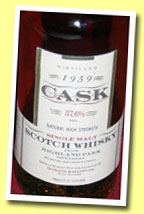 |
| It’s
not too clean, I must say, tasting
younger than it is and sort of wild
and ‘rural’. Finish: quite
long, caramelly, still very meaty
and a little smoky and minty. An excellent
and wild old style Highland Park,
worth 90 points in
my books. |
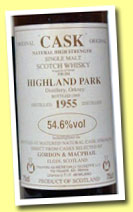 |
Highland
Park 1955/1989 (54.6%, Gordon &
MacPhail ‘Cask’ for Meregalli)
 Colour: gold. Nose: quite extraordinary
at first nosing, starting on a whole
array of various honeys plus notes
of old books and distinctive old bottle
effect. Lots of nougat crème
and pollen, vanilla pods, old sweet
wine (Sauternes)… It’s
also quite smoky (coal oven), with
also various aromatic woods (sandalwood,
thuja, cedar) and leather. Old Rolls-Royce?
Goes on with turpentine and hints
of fruity cheese (comté) as
well as camphor, green Chartreuse
and a little chlorine (nothing unpleasant).
Very extravagant, and of course exceptional.
Mouth: hugely complex! The oak is
here but it’s well mannered.
We have all kinds of herbal and mint
liqueurs (Dantziger Goldwasser spring
to mind).
Colour: gold. Nose: quite extraordinary
at first nosing, starting on a whole
array of various honeys plus notes
of old books and distinctive old bottle
effect. Lots of nougat crème
and pollen, vanilla pods, old sweet
wine (Sauternes)… It’s
also quite smoky (coal oven), with
also various aromatic woods (sandalwood,
thuja, cedar) and leather. Old Rolls-Royce?
Goes on with turpentine and hints
of fruity cheese (comté) as
well as camphor, green Chartreuse
and a little chlorine (nothing unpleasant).
Very extravagant, and of course exceptional.
Mouth: hugely complex! The oak is
here but it’s well mannered.
We have all kinds of herbal and mint
liqueurs (Dantziger Goldwasser spring
to mind). |
| And
Chartreuse indeed, tar liqueur (yes
- had that only once in my life but
you cannot forget it), liquorice,
natural mastic sweets… The whole
is just superb, hugely balsamic and
resinous, the finish being as long
as expected, terpenic, leaving a fabulous
aftertaste of fir honey. Exceptional
and exciting. 93 points. |
| |
February
12, 2007 |
|
 |
TASTING
- TWO OLD LAPHROAIGS
Laphroaig
1977/1999 (43%, Berry Bros, Cask
#5081)  Colour: straw. Nose: starts on a
striking mix of subtle peat (and
congeners) with tropical fruits
(first tangerines). It does remind
me of the old official 1976 and
1977. Not too medicinal but truly
coastal, with puffs of sea breeze,
clams, oysters… Then it’s
back to lemon, tangerines, small
bitter oranges, pepper… The
balance is really perfect. Hints
of old books and candle wax but
it stays fresh and clean. Also virgin
wool, clean mammal (your pick).
A wonderful old-style Laphroaig
on the nose.
Colour: straw. Nose: starts on a
striking mix of subtle peat (and
congeners) with tropical fruits
(first tangerines). It does remind
me of the old official 1976 and
1977. Not too medicinal but truly
coastal, with puffs of sea breeze,
clams, oysters… Then it’s
back to lemon, tangerines, small
bitter oranges, pepper… The
balance is really perfect. Hints
of old books and candle wax but
it stays fresh and clean. Also virgin
wool, clean mammal (your pick).
A wonderful old-style Laphroaig
on the nose. |
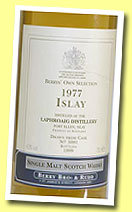 |
| Mouth:
a little softer at the attack but
it gets then really bold, almost punchy
despite its rather low strength. It’s
also very salty (which usually happens
a little later) and then starts to
taste like oysters with lemon juice
and pepper. Surprisingly assertive.
It’s also much more medicinal
than on the nose, with something like
cough syrup, something tarry, herbal
(artemisia, something like verjuice).
Excellent and far from being just
peat infusion plus lemon juice and
pepper. Finish: surprisingly long,
just as maritime and medicinal as
in the books, with a signature on
grapefruit and white pepper. Very
excellent, 92 points. |
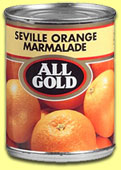 |
Laphroaig
1967/1993 (50.3%, Signatory for Werner
Hertwig, private bottling)
 This one’s never been labelled.
Colour: gold. Nose: first we have
a powerful and dominant (and beautiful)
oakiness but then we have a blast
of true ‘Islayness’. The
register is more or less the same
as the 1977’s but everything
is amplified. Certainly wilder after
a moment, with a bigger peatiness
than in most very old Islayers (Ardbegs
and Laphroigs from the 67’s).
Slightly more medicinal than the 1977,
with more iodine and then camphor.
And that raw wool, and the seashells,
and a little motor oil… And
huge notes of Seville oranges…
A true wonder on the nose.
This one’s never been labelled.
Colour: gold. Nose: first we have
a powerful and dominant (and beautiful)
oakiness but then we have a blast
of true ‘Islayness’. The
register is more or less the same
as the 1977’s but everything
is amplified. Certainly wilder after
a moment, with a bigger peatiness
than in most very old Islayers (Ardbegs
and Laphroigs from the 67’s).
Slightly more medicinal than the 1977,
with more iodine and then camphor.
And that raw wool, and the seashells,
and a little motor oil… And
huge notes of Seville oranges…
A true wonder on the nose. |
| Mouth:
more appeased, almost sluggish at
the attack (on bitter oranges and
resinous wax) but then it’s
a constant ascension. We have these
citrus fruits again (kumquats and
bitter oranges), then a little liquorice,
a little salt (but a little less than
in the Berry Bros), lots of pepper,
then cough sweets, tar, a little mustard…
The mouth feel is quite buttery, it’s
almost greasy says co-taster Christophe.
Gets more medicinal after a moment
and then it’s back to crystallised
bitter oranges. Superb, probably a
little ‘younger’ than
the famous 1966’s and 1967’s
by Signatory. Finish: long but unexpectedly
soothing and appeased again, just
like at the attack, mostly on orange
liqueur, soft pepper and oysters…
An eternal diva, especially on the
nose. 93 points.
(and thanks, Marcel). |
| EXCLUSIVE
JOB AD - A new secret
distillery on Islay is looking
for its first Distillery Manager and
asked Whiskyfun to post this job ad.
Should you be interested, please just
contact the Webmaster... (it's a full-time
job - not webmaster, that is). The
distillery offers £40,000 plus: |
|
|
Brand
new, state of the art facilities
designed by famous architect Willibald
Hundertpfund. |
Well-stocked
grocery store in the vicinity (discount
card provided). |
|
|
Sport
facilities at hand
(here scuba diving). |
Free
housing
(architects: Hundertpfund
& Partners) |
|
|
Free
entertainment for your kids. |
Company
car with driver (2hp) |
| |
|
|
| You'll
work with Lilly, Senior Accountant.
|
...
and with Mary, Marketing Director. |
Free
holiday cottage in the colonies
(towels provided). |
|
|
|
Two
assistants at the visitor center
(no, already recruited). |
Free
work clothing (bottles not provided
we're afraid). |
Monthly
cultural events in the parish (lovely). |
| MUSIC
– Very
heavily recommended listening: guitarist
Nguyen
Le and percussionist
Karim
Ziad (from Joe Zawinul's
gang) play a totally amazing Louanges.mp3
that blends Vietnamese sounds with
Moroccan Gnawa rhythms. It's on the
1998 CD 'Maghreb & Friends' and
I think it is absolutely stunning.
You must absolutely buy this CD (there
is a fantastic bunch of highly skillful
musicians playing with them). |
 |
| |
February
11, 2007 |
|
 |
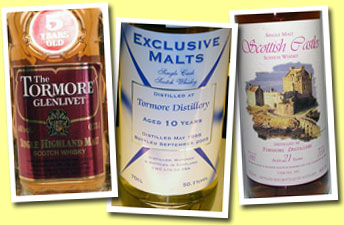 |
TASTING
- THREE TORMORES |
Tormore
5 yo (40%, OB, early 1980’s)
 In its typical hexagonal bottle. Colour:
pale gold. Nose: fresh, grainy, cereally,
slightly metallic, with hints of buttercups
and quite some praline, nougat, caramel
and wood smoke. Totally flawless but
maybe not too interesting… Wait,
the peat grows quite bolder after
a while, as well as fresh oranges
and apples… Okay, more interesting
than expected. Mouth: well, this is
much dryer, cardboardy, tea-ish and,
to tell you the truth, weak. Funny
hints of salt but that’s all
development I can get, except a shortish
and grainy finish. 70 points
but for the nose.
In its typical hexagonal bottle. Colour:
pale gold. Nose: fresh, grainy, cereally,
slightly metallic, with hints of buttercups
and quite some praline, nougat, caramel
and wood smoke. Totally flawless but
maybe not too interesting… Wait,
the peat grows quite bolder after
a while, as well as fresh oranges
and apples… Okay, more interesting
than expected. Mouth: well, this is
much dryer, cardboardy, tea-ish and,
to tell you the truth, weak. Funny
hints of salt but that’s all
development I can get, except a shortish
and grainy finish. 70 points
but for the nose. |
Tormore
10 yo 1995/2005 (50.1%, Exclusive Malts)
 Colour: white wine. Nose: an archetypical
feinty, mashy malt, on porridge, mashed
potatoes, small green bananas and
soaked grains. Faint whiffs of smoke.
Close to new make but certainly not
flawed. Hints of sultanas and ripe
pineapple developing after a moment.
Mouth: more interesting now. Nice
body, nice mouth feel, nice sweetness…
It’s still very grainy/mashy
but we do have more fruits, the pineapple
being more assertive. Also quince,
lots of pears, quite some liquorice…
A clean distillate, really drinkable
even if it won’t make you scratch
your head. Maybe it lacks a few more
years. Finish: rather long, nicely
sweet and fruity, with again quite
some liquorice and notes of violet
sweets. It’s a good, very ‘natural’
young malt. Not too much character
but very honest. 80 points.
Colour: white wine. Nose: an archetypical
feinty, mashy malt, on porridge, mashed
potatoes, small green bananas and
soaked grains. Faint whiffs of smoke.
Close to new make but certainly not
flawed. Hints of sultanas and ripe
pineapple developing after a moment.
Mouth: more interesting now. Nice
body, nice mouth feel, nice sweetness…
It’s still very grainy/mashy
but we do have more fruits, the pineapple
being more assertive. Also quince,
lots of pears, quite some liquorice…
A clean distillate, really drinkable
even if it won’t make you scratch
your head. Maybe it lacks a few more
years. Finish: rather long, nicely
sweet and fruity, with again quite
some liquorice and notes of violet
sweets. It’s a good, very ‘natural’
young malt. Not too much character
but very honest. 80 points. |
Tormore
21 yo 1983/2004 (46%, JWWW Castle Series,
cask #1851)  Colour: amber. Nose: oh, this is funny
and interesting. Very unusual, starting
on a curious mix of very ripe oranges
and cologne but the latter smells
do disappear after a moment. Then
it’s all nice dry sherry and
all kinds of candied citrus fruits,
earl grey tea, Grand-Marnier and something
like rosehip tea and even Turkish
delights. Hugely ‘candied’
indeed but I don’t know if I
like it or not, for it’s so
‘different’. Let’s
see… Mouth: ouch, this is really
bizarre. Starts on huge notes of high
game, rubber and soy sauce…
Lots of cardboard as well, rotten
oranges, 100% cocoa chocolate…
And it gets quite drying, at that.
I feel something went wrong in this
cask. Nails? Mice? Too bad because
you can feel that the rest of the
whisky is probably very good, but
it’s all hidden behind these
bizarre tastes. 65 points.
Colour: amber. Nose: oh, this is funny
and interesting. Very unusual, starting
on a curious mix of very ripe oranges
and cologne but the latter smells
do disappear after a moment. Then
it’s all nice dry sherry and
all kinds of candied citrus fruits,
earl grey tea, Grand-Marnier and something
like rosehip tea and even Turkish
delights. Hugely ‘candied’
indeed but I don’t know if I
like it or not, for it’s so
‘different’. Let’s
see… Mouth: ouch, this is really
bizarre. Starts on huge notes of high
game, rubber and soy sauce…
Lots of cardboard as well, rotten
oranges, 100% cocoa chocolate…
And it gets quite drying, at that.
I feel something went wrong in this
cask. Nails? Mice? Too bad because
you can feel that the rest of the
whisky is probably very good, but
it’s all hidden behind these
bizarre tastes. 65 points. |
MUSIC
– Recommended
listening: it's Sunday, we go classical
with the great late Elizabeth
Parcells again, this
time singing Di
tanti palpiti.mp3 (from Rossini's
Tancredi, arranged by Anton Diabelli
for guitar and voice). |
 |
| |
February
10, 2007 |
|
 |
| TASTING
- TWO 24 yo SCAPAS by CADENHEAD'S |
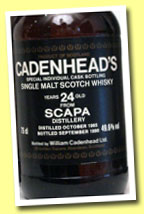 |
(from
minis, variants of the bottle pictured
at the left (several different ABV's
were issued)
Scapa 24 yo 1965/1990 (45.6%, Cadenhead dumpy)
 Colour: pale gold. Nose: fresh,
fruity and maritime at first, then
grainier but still with lots of
iodine and overripe apples as well
as a little mint. Whiffs of geranium,
strawberry jam and old books. Champagne?
Yes, strawberries with champagne.
Cranberry juice… Quite easy
and very pleasant. Mouth: sweet
but much more grainy now, almost
porridgy. Oatcakes, mashed potatoes,
liquorice… Nothing too special
but lots of oomph. A little apple
and cinnamon at the rather long
finish and quite some pepper. Good,
no doubt. 83 points.
Colour: pale gold. Nose: fresh,
fruity and maritime at first, then
grainier but still with lots of
iodine and overripe apples as well
as a little mint. Whiffs of geranium,
strawberry jam and old books. Champagne?
Yes, strawberries with champagne.
Cranberry juice… Quite easy
and very pleasant. Mouth: sweet
but much more grainy now, almost
porridgy. Oatcakes, mashed potatoes,
liquorice… Nothing too special
but lots of oomph. A little apple
and cinnamon at the rather long
finish and quite some pepper. Good,
no doubt. 83 points. |
Scapa
24 yo 1965/1990 (50.1%, Cadenhead dumpy)
 Colour:
much more silent, stony, grassy and
peppery at first nosing, but with
again quite some porridge and also
notes of newly cut cactus. A little
dusty, I must say, but then we have
nice notes of camphor and eucalyptus
(Vicks), roots, wood plank…
Less easy than its lighter twin cask.
Mouth: better! More body, more spices,
more mint. Hints of Turkish delights,
pepper, walnuts… Lots of wood
but a nice one. Goes on with gentian
and liquorice, getting almost thick
and creamy. Colour:
much more silent, stony, grassy and
peppery at first nosing, but with
again quite some porridge and also
notes of newly cut cactus. A little
dusty, I must say, but then we have
nice notes of camphor and eucalyptus
(Vicks), roots, wood plank…
Less easy than its lighter twin cask.
Mouth: better! More body, more spices,
more mint. Hints of Turkish delights,
pepper, walnuts… Lots of wood
but a nice one. Goes on with gentian
and liquorice, getting almost thick
and creamy. |
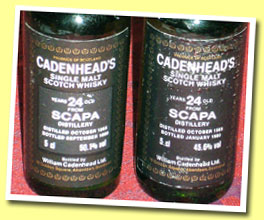 |
| Finish:
really long but woody and spicy…
What’s sure is that this one
is very ‘natural’ and
full bodied: true whisky for big boys.
86 points. |
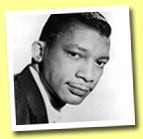 |
MUSIC
– Recommended
listening:
Cool,
very cool: we’re in 1963 and
John William Coltrane blows while
Johnny
Hartman sings One
and only love.mp3. Just superb.
Please buy Trane’s music. |
| |
February
9, 2007 |
|
 |
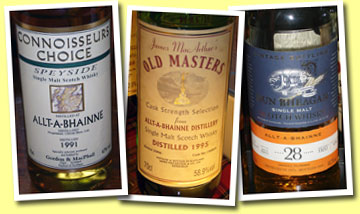 |
TASTING
- THREE ALLT-A-BHAINNE |
Allt-A-Bhainne
1991/2004 (43%, Gordon & MacPhail
Connoisseurs Choice)
 Colour: pale straw. Nose: rather rough
but also very natural, feinty, spirity,
mashy and flinty, which make for a
rather enjoyable mix if you like whiskies
‘close to nature’ (oh
well…) Nice grassiness, notes
of matchbox, coal oven, beech wood
smoke, getting then a little minty…
A nice, very honest malt on the nose.
Mouth: sweet but firm, grassy and
fruity at the same time (apples and
pears), developing mostly on vanilla,
caramel, fudge, nougat… It’s
not a complicated whisky but it’s
really flawless, despite the fact
that it’s probably got less
character on the palate than on the
nose. Medium long finish on salted
caramel… Really ‘nice’,
a good surprise. 80 points.
Colour: pale straw. Nose: rather rough
but also very natural, feinty, spirity,
mashy and flinty, which make for a
rather enjoyable mix if you like whiskies
‘close to nature’ (oh
well…) Nice grassiness, notes
of matchbox, coal oven, beech wood
smoke, getting then a little minty…
A nice, very honest malt on the nose.
Mouth: sweet but firm, grassy and
fruity at the same time (apples and
pears), developing mostly on vanilla,
caramel, fudge, nougat… It’s
not a complicated whisky but it’s
really flawless, despite the fact
that it’s probably got less
character on the palate than on the
nose. Medium long finish on salted
caramel… Really ‘nice’,
a good surprise. 80 points. |
Allt-A-Bhainne
1995/2006 (59.9%, James MacArthur’s,
cask #140864)  Colour: ho-ho, this is even nicer
on the nose! The high alcohol doesn’t
prevent some nice aromas of coffee
and chocolate to come through, as
well as a little caramel, liquorice
and then these vegetal notes (mostly
hay). Lots of vanilla crème
as well. With water: gets truly farmy,
even after the usual saponification
notes have disappeared. Lots of porridge
as well, ‘true’ yoghurt,
oatcake, mash… Nature indeed.
Mouth (neat): sweet, fruity (pears),
almondy… Quite some marzipan
and green tea but it’s too strong
to be enjoyed at cask strength. With
water: sweet and very liquoricy but
not truly interesting. Quite some
salt, that is. Rather long finish,
very ‘neutral’. No flaws-no
thrill. 78 points.
Colour: ho-ho, this is even nicer
on the nose! The high alcohol doesn’t
prevent some nice aromas of coffee
and chocolate to come through, as
well as a little caramel, liquorice
and then these vegetal notes (mostly
hay). Lots of vanilla crème
as well. With water: gets truly farmy,
even after the usual saponification
notes have disappeared. Lots of porridge
as well, ‘true’ yoghurt,
oatcake, mash… Nature indeed.
Mouth (neat): sweet, fruity (pears),
almondy… Quite some marzipan
and green tea but it’s too strong
to be enjoyed at cask strength. With
water: sweet and very liquoricy but
not truly interesting. Quite some
salt, that is. Rather long finish,
very ‘neutral’. No flaws-no
thrill. 78 points. |
Allt-A-Bhainne
28 yo 1975/2004 (60.2%, Dun Bheagan,
refill sherry, cask #33152, 624 bottles)
 Colour: pale gold. Nose: much punchier
even if the difference is very small,
much grassier and feintier. More on
porridge and such but of course water
is needed here. With water: here it’s
the wood that comes through, with
tannins, green tea… A bit hard.
And the whisky got extremely cloudy
– almost like milk - with water
(at roughly 45% and at 22°C, which
is quite scary if you ask me). Mouth
(neat): cough, cough… I can
get a little camphor and mint but
otherwise it’s really burning
and bitter. With water : (imagine
I’ll actually swallow drops
of this, err, ‘milk’!)
Hum, it’s harsh, woody, tannic,
peppery… Hard to enjoy and the
finish is long but very peppery again
and rather bitter… Dismiss!
72 points.
Colour: pale gold. Nose: much punchier
even if the difference is very small,
much grassier and feintier. More on
porridge and such but of course water
is needed here. With water: here it’s
the wood that comes through, with
tannins, green tea… A bit hard.
And the whisky got extremely cloudy
– almost like milk - with water
(at roughly 45% and at 22°C, which
is quite scary if you ask me). Mouth
(neat): cough, cough… I can
get a little camphor and mint but
otherwise it’s really burning
and bitter. With water : (imagine
I’ll actually swallow drops
of this, err, ‘milk’!)
Hum, it’s harsh, woody, tannic,
peppery… Hard to enjoy and the
finish is long but very peppery again
and rather bitter… Dismiss!
72 points. |
| |
February
8, 2007 |
|
 |
| TASTING
- TWO RECENT OFFICIAL JURAS |
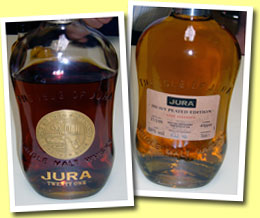 |
Isle
of Jura ‘Twenty One’ (40%,
OB, 2006)  Announcing proudly ‘private
estate’ on the capsule, but
40% seems a bit low nowadays…
Colour: full gold. Nose: much more
happening than expected as far as
both the profile and the ‘power’
are concerned. Very aromatic, with
some rather bold notes of sweet white
wine, candied apricots, caramel and
ham. Meaty and jammy, developing with
lots of praline, nougat and caramel
as well lots of honey…
Announcing proudly ‘private
estate’ on the capsule, but
40% seems a bit low nowadays…
Colour: full gold. Nose: much more
happening than expected as far as
both the profile and the ‘power’
are concerned. Very aromatic, with
some rather bold notes of sweet white
wine, candied apricots, caramel and
ham. Meaty and jammy, developing with
lots of praline, nougat and caramel
as well lots of honey… |
| Somewhat
old style, rather rich and lush. What’s
more, the meatiness grows bolder by
the minute, with also a discreet soapiness
in the background. Gets even a little
too ‘thick’, as if somebody
would have added concentrated wine
and fruit juice – which is obviously
not the case. Other than that it keeps
developing on lots of tea (pu-erh,
with that nice dustiness). Mouth:
okay, it’s not as bold as on
the nose but not weak, nor even weakish.
Extremely caramelly and jammy again,
now on fruitcake, plum jam, nougat,
quite mellow in fact. Goes on with
almonds, then bitter almonds, getting
then much more bitter but in a rather
nice way. The fruitiness vanishes
towards the finish, which isn’t
too long but with a returning meatiness
and a pleasant dryness. A very good
one, no doubt, but I’d have
loved to try it at 45% or more. 85
points. |
Isle
of Jura 1999 ‘Heavy Peated Edition’
(58%, OB for
LMDW France,
40ppm, 2006)  Colour: pale gold. Nose: what a peat
blast indeed – and a nice one!
Sharp and clean as most other young
peaty Juras we could taste these recent
years (including casks for Japan),
with a rather immense minerality and
lots of cold ashes (all kinds) and
tar. Faint farminess in the background
but then lots of camphor, which is
unusual at such young age I think.
And again these wee notes of ham (a
marker?) plus a little cider and apple
juice. A different voice within the
peaty pack, certainly interesting
and maturing quite fast it seems.
Mouth: excellent attack on a relatively
refined peat, very mineral and ‘direct’
again but not rough despite its age.
Is that the tall stills? Quite some
lemon now, walnut skin, green apples,
lemon skin an pips… I like the
purity and the huge tar notes. Lots
of liquorice, maybe even salted one.
Interesting spiciness, just as unusual
(something like strong curry and paprika).
And just as ashy as on the nose. Finish:
it isn’t extraordinarily long
but beautifully tarry, ashy, camphory…
Is Jura a new Longrow (as the latter
was up to 1987?) 88 points.
Colour: pale gold. Nose: what a peat
blast indeed – and a nice one!
Sharp and clean as most other young
peaty Juras we could taste these recent
years (including casks for Japan),
with a rather immense minerality and
lots of cold ashes (all kinds) and
tar. Faint farminess in the background
but then lots of camphor, which is
unusual at such young age I think.
And again these wee notes of ham (a
marker?) plus a little cider and apple
juice. A different voice within the
peaty pack, certainly interesting
and maturing quite fast it seems.
Mouth: excellent attack on a relatively
refined peat, very mineral and ‘direct’
again but not rough despite its age.
Is that the tall stills? Quite some
lemon now, walnut skin, green apples,
lemon skin an pips… I like the
purity and the huge tar notes. Lots
of liquorice, maybe even salted one.
Interesting spiciness, just as unusual
(something like strong curry and paprika).
And just as ashy as on the nose. Finish:
it isn’t extraordinarily long
but beautifully tarry, ashy, camphory…
Is Jura a new Longrow (as the latter
was up to 1987?) 88 points. |
MUSIC
– Recommended
listening: you don't need to have
a great singer to produce a hugely
simple yet fantastic little song
such as After
Hours.mp3. Of course it's the
Velvet
Underground and the
'singer' is drummer Moe Tucker.
(and it's on the 1969 album 'The
Velvet Underground'). Please buy
all these people's music... |
 |
| |
February
7, 2007 |
|
 |
| TASTING
- SEVEN YOUNG LAPHROAIGS |
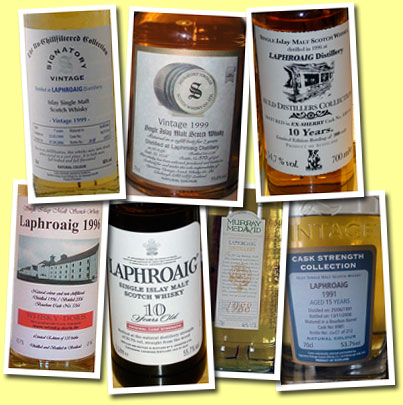 |
Laphroaig
7 yo 1999/2006 (46%, Signatory UCF,
cask #06/373/4, 851 bottles)  Colour: white wine. Nose: really sharp
and very austere, mineral, with lots
of rubbed lemon skin, wet stones and
black pepper. Gets then more mashy
but it does not smell too young at
all. Gets even more flinty after a
moment, with also hints of burnt matchsticks.
Also raw celeriac and soaked grains.
Not one ounce of sweetness. Mouth:
a little sweeter at the attack but
it gets then very lemony and vegetal.
Green tea, pepper, peat, smoked fish…
It does not taste too young and immature
at all. Develops mostly on gentian
and hints of ginseng powder, with
a rather long finish on green tea
and pepper. Classic young Laphroaig,
not complex but flawless. 83
points.
Colour: white wine. Nose: really sharp
and very austere, mineral, with lots
of rubbed lemon skin, wet stones and
black pepper. Gets then more mashy
but it does not smell too young at
all. Gets even more flinty after a
moment, with also hints of burnt matchsticks.
Also raw celeriac and soaked grains.
Not one ounce of sweetness. Mouth:
a little sweeter at the attack but
it gets then very lemony and vegetal.
Green tea, pepper, peat, smoked fish…
It does not taste too young and immature
at all. Develops mostly on gentian
and hints of ginseng powder, with
a rather long finish on green tea
and pepper. Classic young Laphroaig,
not complex but flawless. 83
points. |
Laphroaig
7 yo 1999/2006 (59.4%, Signatory, cask
#2756, 598 bottles)
 Colour: white wine. Nose: similar
for a while but in a simpler way.
Quite spirity, a little more perfumy
than the 46% version. Whiffs of ether
and fresh walnuts. Let’s try
it with a little water… It now
really resembles the version at 46%
after a few minutes of rest), with
maybe just some extra-notes of cow
stable. I must say I like this young
one a lot. Mouth (neat): bold, powerful,
truly warming, peaty and peppery although
not that much… But drinkable
despite the strength and the notes
of raw alcool, tutti frutti (all over
rootie). Also big bold notes of pear
spirit that manage to dominate the
peat. With water: excellent development
now, on dried pears and peat, pepper,
papayas (unusual), liquorice allsorts,
loads of cardamom… What an excellent
surprise (but don’t forget to
add water!) Finish: long, balanced,
still on pears and pepper… One
would have thought they bottled this
one to cash in on a very young cask
but that’s probably not the
case, this Laphroaig is already at
a peak (but there may have been other
peaks in its career, it’s an
excellent cask). 87 points.
Colour: white wine. Nose: similar
for a while but in a simpler way.
Quite spirity, a little more perfumy
than the 46% version. Whiffs of ether
and fresh walnuts. Let’s try
it with a little water… It now
really resembles the version at 46%
after a few minutes of rest), with
maybe just some extra-notes of cow
stable. I must say I like this young
one a lot. Mouth (neat): bold, powerful,
truly warming, peaty and peppery although
not that much… But drinkable
despite the strength and the notes
of raw alcool, tutti frutti (all over
rootie). Also big bold notes of pear
spirit that manage to dominate the
peat. With water: excellent development
now, on dried pears and peat, pepper,
papayas (unusual), liquorice allsorts,
loads of cardamom… What an excellent
surprise (but don’t forget to
add water!) Finish: long, balanced,
still on pears and pepper… One
would have thought they bottled this
one to cash in on a very young cask
but that’s probably not the
case, this Laphroaig is already at
a peak (but there may have been other
peaks in its career, it’s an
excellent cask). 87 points. |
Laphroaig
1996/2006 (54.7%, Jack Wieber’s
Auld Distillers Collection, cask #5369,
sherry)  Colour: pale gold. Nose: fresh, maritime,
with lots of iodine at first nosing
(more than in the Signatories) and
then we have the creamy, caramelly
and slightly vinous notes of sherry
arising. Goes on with soaked grains,
porridge… Mashed potatoes and
lots of pepper. Rather wild but a
little tamed by the sherry. Notes
of fudge. Mouth: bold, very powerful,
almost pungent, with lots of citrus
fruits (tangerines, pink grapefruits,
oranges) and a true peat blast. The
sherry strikes back and softens the
whole a bit (just a bit), with quite
some nougat now, caramel, vanilla
crème, crystallised oranges…
Gets sweeter and sweeter with time
but the peat and the pepper do guard
the house. Finish: not exceptionally
long but very coherent with the rest,
with the sweetness giving way to even
more pepper and even chilli. Beastly
despite the sweetness from the sherry,
the peat freaks should love this one
except if they hate sherry. 85
points.
Colour: pale gold. Nose: fresh, maritime,
with lots of iodine at first nosing
(more than in the Signatories) and
then we have the creamy, caramelly
and slightly vinous notes of sherry
arising. Goes on with soaked grains,
porridge… Mashed potatoes and
lots of pepper. Rather wild but a
little tamed by the sherry. Notes
of fudge. Mouth: bold, very powerful,
almost pungent, with lots of citrus
fruits (tangerines, pink grapefruits,
oranges) and a true peat blast. The
sherry strikes back and softens the
whole a bit (just a bit), with quite
some nougat now, caramel, vanilla
crème, crystallised oranges…
Gets sweeter and sweeter with time
but the peat and the pepper do guard
the house. Finish: not exceptionally
long but very coherent with the rest,
with the sweetness giving way to even
more pepper and even chilli. Beastly
despite the sweetness from the sherry,
the peat freaks should love this one
except if they hate sherry. 85
points. |
Laphroaig
1996/2006 (55,7%, Whisky Doris, Bourbon
C#5366, 120 bottles)
 Colour: white wine. Nose: close to
the Wieber but sharper and more mineral
although a little les expansive. Sea
breeze and oysters, less medicinal
than expected. Hints of sour cream,
yoghurt. Gets a little fruitier and
more floral (lilies, not too ripe
strawberries),. Nice balance, an ultra-clean
young Laphroaig. Mouth: we have exactly
the same differences with the sherried
one as on the nose. Sharper, more
uncompromising, all on peat, freshly
cut apple and pepper. Flawless. The
finish is a bit longer than its sibling’s,
maybe more elegant… In short,
don’t look for lots of subtleties
but if you like big bold young natural
peat, this one’s for you. 85
points.
Colour: white wine. Nose: close to
the Wieber but sharper and more mineral
although a little les expansive. Sea
breeze and oysters, less medicinal
than expected. Hints of sour cream,
yoghurt. Gets a little fruitier and
more floral (lilies, not too ripe
strawberries),. Nice balance, an ultra-clean
young Laphroaig. Mouth: we have exactly
the same differences with the sherried
one as on the nose. Sharper, more
uncompromising, all on peat, freshly
cut apple and pepper. Flawless. The
finish is a bit longer than its sibling’s,
maybe more elegant… In short,
don’t look for lots of subtleties
but if you like big bold young natural
peat, this one’s for you. 85
points. |
Laphroaig
10 yo Cask Strength (55.7%, OB, circa
2006)  Colour: gold. Nose: surprisingly more
discrete but getting then much more
medicinal than both 1996’s.
Notes of mercurochrome, bandages,
eucalyptus… Plus, of course,
the coastal smells. Also more fresh
butter and then quite some apple compote
and pepper as well as cider and lager
beer. More balanced and ‘crafted’
than the IB’s, but less peated
and ‘without compromise’
than earlier batches. Mouth: truly
richer and thicker than both 1996’s
at the attack as well as more complex
and even ‘subtle’. Bitter
oranges, marmalade, pepper, salt (which
we didn’t have in the others),
liquorice, liquorice sticks, smoked
tea… Peppered oysters…
Probably not as grand as previous
versions but still pretty brilliant.
Excellent finish, long but a little
mellower, with little candy sugar
besides the peat and company plus
that very funny saltiness. Still a
very, very good dram and certainly
a bang-for-your-bucks whisky, lacking
perhaps just a little majesty (where
are the green stripes?) to make it
to more than 89 points
in my books.
Colour: gold. Nose: surprisingly more
discrete but getting then much more
medicinal than both 1996’s.
Notes of mercurochrome, bandages,
eucalyptus… Plus, of course,
the coastal smells. Also more fresh
butter and then quite some apple compote
and pepper as well as cider and lager
beer. More balanced and ‘crafted’
than the IB’s, but less peated
and ‘without compromise’
than earlier batches. Mouth: truly
richer and thicker than both 1996’s
at the attack as well as more complex
and even ‘subtle’. Bitter
oranges, marmalade, pepper, salt (which
we didn’t have in the others),
liquorice, liquorice sticks, smoked
tea… Peppered oysters…
Probably not as grand as previous
versions but still pretty brilliant.
Excellent finish, long but a little
mellower, with little candy sugar
besides the peat and company plus
that very funny saltiness. Still a
very, very good dram and certainly
a bang-for-your-bucks whisky, lacking
perhaps just a little majesty (where
are the green stripes?) to make it
to more than 89 points
in my books. |
Laphroaig
14 yo 1988/2002 (46%, Murray McDavid,
bourbon cask, MM3863)
 Colour: white wine. Nose: this is
a different kind of Laphroaig, maybe
the distillation regime was different
back in 1988, or maybe it’s
the further ageing. Much waxier and
more vegetal, subtler and more complex…
And certainly much more ‘coastal’.
Lots of fresh kelp, sea breeze, then
fresh walnuts and almonds, a little
paraffin, apple skin… The peat
is silkier but certainly not absent.
Goes on with flowers (a little lavender
and violets) and even hints of diesel
oil. Quite superb on the nose. Mouth:
now it got rougher and wilder, closer
to its colleagues. Lots of peat, a
little mustard, crystallized quinces
and lemons, green pepper, black pepper…
Beautiful notes of smoked tea and
hints of soy sauce (with quite some
salt). Sure it’s a little rounder
than the younger bros but it’s
still got all its teeth. The finish
is quite beautiful, the peat, liquorice
and crystallised lemons lingering
on your palate for quite a few caudalies.
Excellent laphroaig, 89 points.
Colour: white wine. Nose: this is
a different kind of Laphroaig, maybe
the distillation regime was different
back in 1988, or maybe it’s
the further ageing. Much waxier and
more vegetal, subtler and more complex…
And certainly much more ‘coastal’.
Lots of fresh kelp, sea breeze, then
fresh walnuts and almonds, a little
paraffin, apple skin… The peat
is silkier but certainly not absent.
Goes on with flowers (a little lavender
and violets) and even hints of diesel
oil. Quite superb on the nose. Mouth:
now it got rougher and wilder, closer
to its colleagues. Lots of peat, a
little mustard, crystallized quinces
and lemons, green pepper, black pepper…
Beautiful notes of smoked tea and
hints of soy sauce (with quite some
salt). Sure it’s a little rounder
than the younger bros but it’s
still got all its teeth. The finish
is quite beautiful, the peat, liquorice
and crystallised lemons lingering
on your palate for quite a few caudalies.
Excellent laphroaig, 89 points. |
Laphroaig
15 yo 1991/2006 (53.7%, Signatory,
cask #6981, 212 bottles)
 Colour: white wine. Nose: now it’s
the wood that’s talking, with
a bold vanilla like if it was matured
or finished in new oak. Probably the
most bourbonny Laphroaig I ever had,
to the point where the oak almost
dominates the peat. Goes on with vanilla
fudge, green bananas, mustard seeds…
The spirit starts to make it through
the wood after a while, the whole
getting g very green and grassy and
then quite minty and camphory. No
sweetness whatsoever except the one
that’s brought by the wood (which
means very little here). In short,
ultra-sharp. Mouth: bang! Tons of
peat plus tons of oak and tons of
lemon… I guess this is what
we’d call a bold whisky (or
a peatwoodbomb?) Lots of smoked tea
(lapsang souchong), liquorice and
mint sweets, herb liqueur (Jägermeister
– err…), getting even
more rooty, earthy and peppery with
time… What’s amazing is
that it’s nor rough nor vulgar,
quite the contrary in fact. The tannins
are very well integrated, at that,
and we have lots of crystallised quince
again. A Truly excellent Laphroaig
despite the woody start – I
guess you need a terrific spirit to
tame such a heavy woodiness in such
a beautiful manner. Finish: long,
still bold and complex, peaty, earthy
and orangey, getting quite salty and
finally camphory (medicinal, obviously)…
Extremely good I think. 91
points.
Colour: white wine. Nose: now it’s
the wood that’s talking, with
a bold vanilla like if it was matured
or finished in new oak. Probably the
most bourbonny Laphroaig I ever had,
to the point where the oak almost
dominates the peat. Goes on with vanilla
fudge, green bananas, mustard seeds…
The spirit starts to make it through
the wood after a while, the whole
getting g very green and grassy and
then quite minty and camphory. No
sweetness whatsoever except the one
that’s brought by the wood (which
means very little here). In short,
ultra-sharp. Mouth: bang! Tons of
peat plus tons of oak and tons of
lemon… I guess this is what
we’d call a bold whisky (or
a peatwoodbomb?) Lots of smoked tea
(lapsang souchong), liquorice and
mint sweets, herb liqueur (Jägermeister
– err…), getting even
more rooty, earthy and peppery with
time… What’s amazing is
that it’s nor rough nor vulgar,
quite the contrary in fact. The tannins
are very well integrated, at that,
and we have lots of crystallised quince
again. A Truly excellent Laphroaig
despite the woody start – I
guess you need a terrific spirit to
tame such a heavy woodiness in such
a beautiful manner. Finish: long,
still bold and complex, peaty, earthy
and orangey, getting quite salty and
finally camphory (medicinal, obviously)…
Extremely good I think. 91
points. |
MUSIC
– JAZZ
- Recommended listening: outdated,
Sun
Ra and his Outer Space Arkestra?
Probably but they represent an interesting
chunk of the history of jazz and
a good example is their Nuclear
war.mp3 (from 1982 I believe).
Now, 'they' could still push that
button... Please buy Sun Ra's music,
he's a king. |
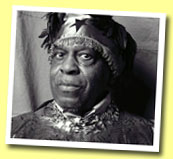 |
| |
February
6, 2007 |
|
 |
TASTING
- TWO MACDUFFS
Glen
Deveron 12 yo (40%, OB, William Lawson,
late 1970’s)
 Colour: pale gold. Nose: typical
old Speysider’s nose, rather
delicate, nutty, floral and cereally
but swinging to very obvious bottle
age aromas (a little metal, crystallised
bitter oranges, mint and coal smoke
plus a faint mustiness). Notes of
cured ham, sherry, getting more
minty and smoky after a moment with
also notes of lemon balm and chamomile
tea.
Colour: pale gold. Nose: typical
old Speysider’s nose, rather
delicate, nutty, floral and cereally
but swinging to very obvious bottle
age aromas (a little metal, crystallised
bitter oranges, mint and coal smoke
plus a faint mustiness). Notes of
cured ham, sherry, getting more
minty and smoky after a moment with
also notes of lemon balm and chamomile
tea. |
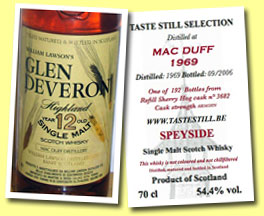 |
| Mouth:
more tired now, not weak but a little
teaish and cardboardy, drying…
A little green banana and candy sugar,
speculoos… Not much else. Too
bad, the nose was truly pleasant.
Finish: short but drying and papery,
with just a little caramel. 72
points. |
MacDuff
1969/2006 (54.4%, Taste Still Selection,
cask #3682, 192 bottles)
 Colour: gold. Nose: starts on big
bold fat notes of new oak and sherry.
Litres of varnish, cellulose glue
and turpentine… Just like if
you entered a cabinetmaker’s
workshop. Really expressive! All that
mellows after a moment and gives way
to fruitier notes (mostly blackcurrants)
as well as quite some marzipan and
notes of peonies plus this cured ham
again. And then it’s the mint,
camphor and eucalyptus plus quite
some resin from the wood. Mouth: more
or les the same happens on the palate
so you really need not to dislike
oak. The good news is that the balance
is still very nice and the oak not
drying at all, the whole being closer
to a malt matured in new oak rather
than in refill sherry. So, we have
quite some bananas, vanilla, marzipan,
strawberries, hints of kirsch, butter
caramel… Extremely ‘active’
at 37 years old. Finish: long, oaky
and vanilled like a good bourbon’s.
Amazingly young in fact, full bodied,
almost nervous… A good one to
trick your friends (say, how old is
this one, Joe?) 86 points.
Colour: gold. Nose: starts on big
bold fat notes of new oak and sherry.
Litres of varnish, cellulose glue
and turpentine… Just like if
you entered a cabinetmaker’s
workshop. Really expressive! All that
mellows after a moment and gives way
to fruitier notes (mostly blackcurrants)
as well as quite some marzipan and
notes of peonies plus this cured ham
again. And then it’s the mint,
camphor and eucalyptus plus quite
some resin from the wood. Mouth: more
or les the same happens on the palate
so you really need not to dislike
oak. The good news is that the balance
is still very nice and the oak not
drying at all, the whole being closer
to a malt matured in new oak rather
than in refill sherry. So, we have
quite some bananas, vanilla, marzipan,
strawberries, hints of kirsch, butter
caramel… Extremely ‘active’
at 37 years old. Finish: long, oaky
and vanilled like a good bourbon’s.
Amazingly young in fact, full bodied,
almost nervous… A good one to
trick your friends (say, how old is
this one, Joe?) 86 points. |
| MUSIC
– Recommended
listening: she's Serge Gainsbourg
and Jane Birkin's daughter and (of
course) she's also singing (some would
say she whispers but she does that
with gusto): she's Charlotte
Gainsbourg and one of
her nicest songs is The
songs that we sing.mp3 (err...)
from her album 5:55, music by the
band 'Air' and probably somehow by
Serge Gainsbourg. Please buy Charlotte
Gainsbourg's music... (and thanks
for the hint, Paul). |
 |
| |
February
5, 2007 |
|
 |
| TASTING
– THE IMPOSSIBLE (PHENOLIC)
SESSION |
|
|
A very unusual session that may well
not make a lot of sense (as if you
could compare, say a Baillie Nicol
Jarvie with all Rieslings and claim
the blend is better ;-)) but that
I’ve been willing to do since
a long time. I’ve always thought
these four specific drinks had common
aromas and flavours so let’s
just taste them together today and
see what happens – and if it
works… So, we’ll have
a tea, a beer, a wine and a malt,
but of course not just any of them.
|
 |
Pu
er ‘Maison des Trois Thés’
1992 (for La Maison du Whisky Paris)
Pu er (or Pu-erh) is a green tea from
Yunnan, China and is the only tea
that’s aged in cellars just
like wine (I’m talking about
genuine pu-ers here). It gets ‘black’,
i.e fermented naturally after production,
contrarily to usual black tea, and
sometimes people call it ‘post-fermented’
tea. 1992 is relatively young, you
can find pu-ers that are 50 or 60
years old in the market and I’ve
read that some collectors own tea
from the Ming era that are more than
500 years old. I infused this one
for one minute, my notes are for the
first water (you can make a good dozen
waters with genuine pu-erh). |
| Colour:
pink gold – salmony. Nose: very
expressive, extremely earthy and maritime
at the same time. Huges notes of kelp,
fisherman’s nets… Then
we have lots of fresh wild mushrooms,
wet moss and peat, humus, whiffs of
moist wine cellar, city rain after
a good two sunny weeks, wet clay…
Something delicately ashy in the background.
Hints of dried flowers. Most aromas
are to be found in some malts as well.
Mouth: very earthy again at first
sip but the we do have some fruits
(hints of strawberries and dried pears).
Mushrooms again, liquorice sticks,
fermented grass and fruits…
Probably less demonstrative than on
the nose in fact but great if you
like earthiness in your tea. Finish:
hard to talk about a finish I think,
but it’s only there that some
rather drying tannins do appear –
just a few in fact. In short, a grand
tea… 90 points.
(I’ve had a 30 yo last year that
I would rate 96, but these ratings
mean nothing, I’m not experienced
enough to rate tea seriously, I’m
afraid.) |
| Trappist
Westvleteren ‘12’ (10.2%,
Belgian beer) There
are three beers made at this abbey
and the ‘12’ is the strongest.
These beers are very rare (you can
only get them at the abbey and only
once a month, so aficionados are queuing)
and they aren’t even labelled,
only the cap carrying a little info.
Colour: deep amber – mahogany,
with lots of congeners. Nose: now
we start more on caramel but the earthiness
is well here as well as faint hints
of seawater. Quite clean, probably
a little less complex than the tea
but the balance is really perfect.
Notes of buttered caramel, moss, old
furniture, then quite some shoe polish
and then it gets much more malty.
But it’s very phenolic indeed.
|
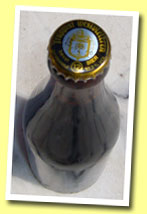 |
| Mouth:
just like with the tea it’s
much fruitier now. Heavy notes of
fruitcake, raspberry liqueur, malt,
caramel, liqueur-filled chocolate…
Hints of Worcester sauce. Maybe not
exactly phenolic on the palate but
then the finish is. Quite some tannins
just like in the tea, bitter chocolate,
raspberry liqueur again, kind of a
smokiness… What’s sure
is that this beer is very complex
and not as thick (and cloying) as
expected considering its high strength.
Truly beautiful and God knows I’m
not too much into beer (well, what
the largest part of the world calls
‘beer’). 93 points
– again, please don’t
take them seriously. (and thanks
Lindores). |
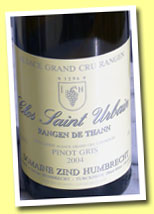 |
Pinot
Gris 2004 Rangen de Thann (16%, Domaine
Zind-Humbrecht, Alsatian wine, France)
Olivier, our new ‘best winemaker
of the world’ according to the
American press (they can’t be
wrong, can they?) did put an ‘1’
grade on this one, which means it’s
perfectly dry. I’ve always thought
the Rangen, which is a first growth
in Alsace, had a peaty character,
probably thanks to the volcanic soil.
Olivier sometimes jokes and let some
people think he does peat his grapes
indeed. Good fun! Colour: gold. Nose:
first we have a little fruit (quince
and butter pears) but that’s
just an ‘appetizer’ because
the earthiness and peatiness (yes)
do arise then. Hints of bicycle inner
tube (superb here), shoe polish, fresh
kelp again, wet stones, ashes, coal
oven. |
| Then
the fruits strike back, more candied
and jammy than what I remembered (apricots,
yellow peaches and melon) but then
we have quite some smokiness and whiffs
of, yes, sea breeze (despite the fact
that Alsace is 600 km away from the
nearest sea). Mouth: the attack is
not violent but extremely specific,
unlike any other wine that I can think
of (except perhaps some old Château-Chalons).
You could think it would be sweet
and fruity when you first get it into
your mouth but it isn’t. Dry,
with lots of walnuts, wax, pu-erh
tea (yes, funny how it resembles the
tea we just had – in a certain
way), high-end cider, hints of dried
mushrooms, wet pebble. It’s
also very slightly balsamic. Finish:
long, dry, walnutty, with a bold note
of terroir (hard to describe, it’s
“the Rangen”) and maybe
hints of vanilla sauce. Not easy-easy
but truly superb. For wine aficionados
and certainly not for newborn fruit/wood
bombs lovers. 94 points
(on my malto-scale, please don’t
compare with the Spec, Parker etc.) |
Caol
Ila 36 yo 1965/2002 (45.6%, Gordon
& MacPhail Private Collection,
cask #4211)  The oldest Caol Ila I ever had I think.
Colour: gold. Nose: fantastic attack
on shoe polish, metal polish and a
whole plate of oysters. Extraordinary
‘evolution of peat’. Lots
of fresh butter after that, vanilla
crème, that pu-erh tea indeed
(earthiness, roots, wet plants) but
also ‘usual’ green tea...
Gets even more maritime after that,
on seashells, lobsters (right, right),
‘seawater that didn’t
move for a while’, seaweed…
Amazing freshness considering its
age, with the mint leaves arriving
after a good fifteen minutes, as well
as hints of pine needles and slight
camphory notes… Probably not
as bold as a very old Laphroaig, Lagavulin
or Ardbeg but maybe more delicate.
May I say ‘feminine’?
The oldest Caol Ila I ever had I think.
Colour: gold. Nose: fantastic attack
on shoe polish, metal polish and a
whole plate of oysters. Extraordinary
‘evolution of peat’. Lots
of fresh butter after that, vanilla
crème, that pu-erh tea indeed
(earthiness, roots, wet plants) but
also ‘usual’ green tea...
Gets even more maritime after that,
on seashells, lobsters (right, right),
‘seawater that didn’t
move for a while’, seaweed…
Amazing freshness considering its
age, with the mint leaves arriving
after a good fifteen minutes, as well
as hints of pine needles and slight
camphory notes… Probably not
as bold as a very old Laphroaig, Lagavulin
or Ardbeg but maybe more delicate.
May I say ‘feminine’?
|
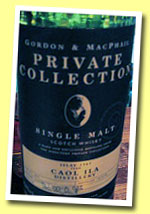 |
| Mouth:
it’s bolder and thicker now,
probably a little bitterish at the
attack, and then it gets extremely
and amazingly similar to the Pinot
Gris in a certain way, with these
walnutty, mineral and mushroomy notes.
Lots of pepper after that, strong
paprika, bitter tannins getting quite
dominating… Lots of peat remaining
but the wood took maybe a little more
than its share after all these years.
Finish: long, dry, bitter, mainly
on very infused (okay, over-infused)
green tea and lots of pepper. Don’t
get me wrong, it’s still a beautiful
whisky on the palate (the attack is
great) but I feel it got a bit too
dry (and a tad bony flavour-wise,
as we sometimes say regarding wine).
But the nose was beautiful enough
to keep the whole at 90 points.
(and thanks, Patrick). |
| A
conclusion for once: just like I always
tell my friends (and especially my
mum), it’s not the alcohol that
does the job and this odd tasting
session proved it. It’s certainly
not the tea (O%, eh!) that was the
‘weakest’ of the four
drinks. And it’s maybe not the
Caol Ila that was the most phenolic!
What’s sure is that it’s
much easier to taste such different
products than I had thought, provided
you try them in an ascending ‘alcoholic
order’ and, most importantly,
provided you keep an open mind and
don’t try to compare their ‘qualities’
but just some of their descriptors/markers,
which may only be interesting if there
are some similarities indeed. I’m
afraid just any tea vs any beer vs
any wine vs any whisky wouldn’t
work at all. Just like a rather mundane
blended scotch vs all Rieslings wouldn’t… |
| MUSIC
– Recommended
listening: how often do we have electronica
on WF? Yes, almost never but this
time I think it's worth a listen:
it's a French guy living in Okinawa,
Paul
Mahoux, and his piece
is called tokashikighostokashiikiss.mp3
(no less). Clever, isn't it? Please
buy Paul Mahoux's music. |
 |
| |
February
4, 2007 |
|
 |
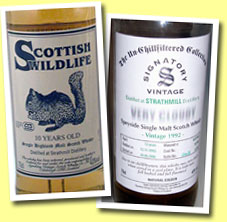 |
TASTING
- TWO STRATHMILLS
Strathmill
10 yo (43%, Scottish Wildlife by
Signatory, 1990’s )
 Colour: white wine. Nose: fresh,
clean, rather expressive at first
nosing although a little spirity
and quite mashy/feinty. Like a blend
of porridge and mashed potatoes
with a little rosewater and drops
of pear spirit. Nice recipe –
ahem. Little oak influence and lots
of nature indeed. Discreet whiffs
of wood smoke and roasting nuts.
Not the most interesting nose ever
but it’s quite pleasant.
Colour: white wine. Nose: fresh,
clean, rather expressive at first
nosing although a little spirity
and quite mashy/feinty. Like a blend
of porridge and mashed potatoes
with a little rosewater and drops
of pear spirit. Nice recipe –
ahem. Little oak influence and lots
of nature indeed. Discreet whiffs
of wood smoke and roasting nuts.
Not the most interesting nose ever
but it’s quite pleasant. |
| Mouth:
things aren’t really improving
on the palate, alas. Grainy and cardboardy,
with a rather thin mouth feel despite
kind of a smokiness (or rather notes
of coffee beans). Gets a little musty,
not exactly dirty but sort of indefinite…
Close to the grain, I’d say
(slight bitterness included). Finish:
quite short, still rather cardboardy
and very grainy… Well, I guess
they really tried to get as close
to Mother Nature as possible for the
Scottish Wildlife Trust – and
they succeeded. Congrats, but it’s
hard to go any higher than 72
points. As often, the nose
was nicer than the palate. |
Strathmill
1992/2006 ‘Very Cloudy’
(40%, Signatory for LMW, cask #05/901,
362 bottles) Colour: white wine – and not
that cloudy. Nose: more expressive,
bolder and woodier, although maybe
a bit strange. Overripe oranges? Notes
of cologne, pineapple liqueur, pear
juice… Lots of wood smoke again,
including fir or pine. Smells more
and more like pear juice, or pear
liqueur for that matter, with maybe
a little ‘natural’ mint.
Ha, youth! Mouth: more body and more
oomph, with again lots of pears and
pineapples but also a rather interesting
grassiness. Turnips? Raw salsify?
Celeriac? What’s sure is that
it’s also a little rooty and
earthy (gentian), with a little salt(iness).
Medium long finish, grainier now,
with a little orange after a few caudalies…
Perfectly drinkable, this one. Maybe
chilled in summer? 78 points.
Colour: white wine – and not
that cloudy. Nose: more expressive,
bolder and woodier, although maybe
a bit strange. Overripe oranges? Notes
of cologne, pineapple liqueur, pear
juice… Lots of wood smoke again,
including fir or pine. Smells more
and more like pear juice, or pear
liqueur for that matter, with maybe
a little ‘natural’ mint.
Ha, youth! Mouth: more body and more
oomph, with again lots of pears and
pineapples but also a rather interesting
grassiness. Turnips? Raw salsify?
Celeriac? What’s sure is that
it’s also a little rooty and
earthy (gentian), with a little salt(iness).
Medium long finish, grainier now,
with a little orange after a few caudalies…
Perfectly drinkable, this one. Maybe
chilled in summer? 78 points. |
| MUSIC
– Recommended
listening: it's Sunday, we go classical
with Claudio Monteverdi’s very
‘sweet’ and famous Laudate
Pueri.mp3, here by Swiss brothers
Lorin
and Terry Wey (former
members of Vienna’s Knaben Chor).
Please go to their concerts. |
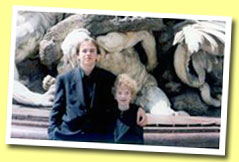 |
| |
February
3, 2007 |
|
 |
| CONCERT
REVIEW by Nick Morgan
JAMIE-T The Astoria, London,
January 24th 2007 |
| It
was when the group of intimidating
thick-set lager-drinking heavyweights
in front of us starting snorting huge
amounts of coke from their clenched
fists that I really thought we might
be in for a rough time. They’d
already serenaded the surrounding
crowd with menacing football chants
as the stage was being reset and now
they looked totally out of control,
falling around to a wild ‘Ike
and Tina’. On stage, mop haired
in an unprepossessing blue sports
shirt Jamie T (or Jaime Treays to
give him his full name) has been kicking
up a riot since the first few bars
of rockabilly infused ‘Brand
new bass guitar’ half an hour
before. There are more beer cans flying
through the air (most, but not all,
in the direction of the stage) than
there really should be, and behind
me there’s a gang of shrieking
girls, well … shrieking and
taking photographs of themselves.
Actually they shriek most of the night. |
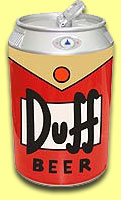 |
 |
I
was lucky to hear some of young (he’s
20, which reminds me that although
we did see a mum and embarrassed daughter
when we left I do believe that this
time I was the oldest person in the
Pickle Factory) Jamie’s
demo tapes about eighteen months ago
and was immediately struck by his
huge talent. He was accompanying himself
on his bashed-up four string acoustic
bass guitar, and there may have been
some percussion, but songs like Salvador
really stood out as being different,
not just for the content of the lyrics
but the rhythmical structures that
they weave. |
| It’s
a compelling and dizzee fusion of
playground chants, music-hall ditties,
Chas and Dave, ska and rap, played
to a remorseless and driving drums
and bass punk beat. That’s my
take – have a look at the cleverly-composed
cover of his new album to see where
Jamie thinks his influences lie. Live
on stage with a band his music may
lose some of its complexity and subtlety,
but none of its infectious rhythm.
And it’s
hot – ‘Calm down dearest’
his new single charted at No 2 a couple
of weeks ago thanks to downloads;
his debut album Panic Prevention was
released on January 29th. And it goes
without saying that the Astoria is
heaving. |
| Jamie’s
lyrics very much reflect the zeitgeist
of the twenty year old south Londoner
that he is, but there is a hidden
and knowing maturity to many of the
songs that you might not pick up at
first hearing. There’s certainly
too much drinking, too many drugs,
too many cigarettes, not enough sleep,
and there are lots of girls of one
sort or another who behave like ‘Sheila’
- “Drunk, she stumbles down
by a river, screams calling London”.
|
| I
begin to think that most of the shrieking
girls (they’re not just behind
me, they’re all over the bloody
place) might be called Sheila, though
it’s sadly pretty clear that
the irony of songs like this or ‘Operation’
are lost on a large part of the audience,
for tonight at least. But Jamie just
spits out his lyrics like a machine
gun – with almost perfect enunciation
as he works his way through twelve
songs before returning with another
four more. |
 |
|
I have to say I most enjoyed ‘Operation’
‘Ike and Tina’ and ‘Northern
Line’, but would also have to
confess we missed the encore as we
decided to make a break for safety
half way through ‘Salvador’. |
|
Something will have to go very wrong
in Jamie T’s career to prevent
him being around for some time. Unlike
the rather contrived Mika (who currently
heads the UK singles charts with ‘Grace
Kelly’) this young man has a
depth of vision, an ability with words
and just substance that should mean
he remains a fixture on the music
scene for some time. So long as he
can keep on dodging the beer cans.
- Nick Morgan (concert photographs
by Kate) |
| Thank
you Nick. A very good new artiste
indeed (I’d add The Clash, Talking
Heads and Richard Hell to the references).
Now, the main difference between this
new generation and the former one
(the post-punks from the 70’s)
is that the old ones would probably
not have put important keywords such
as ‘buy’, ‘download’,
‘order’ or even ‘pre-order’
everywhere on their websites. That’s
why, I guess, the ‘new’
ones do have a future, and I just
heard Jamie-T's debut album 'Panic
Prevention' that was released five
days ago, is already #2 in the UK
album charts. And there are excellent
tunes to be found on his myspace
page indeed. -S. |
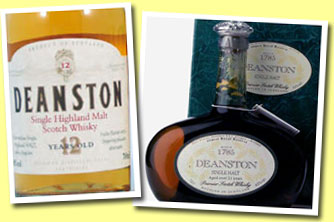 |
TASTING
- TWO OFFICIAL DEANSTONS |
Deanston
12 yo (43%, OB, early 200O’s)
 Colour: white wine. Nose: quite grainy
at first nosing but gets then more
metallic and waxy (paraffin, oiled
paper) as well as nicely herbal (lots
of thyme and dill, even celery). Quite
some overripe oranges and hints of
olive oil. Alas, it’s also a
little cardboardy and sort of watery,
but I like this much better than the
versions from the 1990’s. Mouth:
hmm, sure it’s a bit weakish
at the attack but it sort of takes
off after a few seconds, getting even
powerful. Oily, thick mouth feel,
quick to get a little too cardboardy,
alas, with also this waxiness that’s
not too nice here. Gets very grassy,
maybe a little acrid, with quite some
salt at the end. Oomphy it is! The
finish is quite long at that, grainty
and salty, with a bitter signature
that isn’t too nice. The whole
is rather good I must say, worth trying
in any case. 77 points
(I have older versions at 55).
Colour: white wine. Nose: quite grainy
at first nosing but gets then more
metallic and waxy (paraffin, oiled
paper) as well as nicely herbal (lots
of thyme and dill, even celery). Quite
some overripe oranges and hints of
olive oil. Alas, it’s also a
little cardboardy and sort of watery,
but I like this much better than the
versions from the 1990’s. Mouth:
hmm, sure it’s a bit weakish
at the attack but it sort of takes
off after a few seconds, getting even
powerful. Oily, thick mouth feel,
quick to get a little too cardboardy,
alas, with also this waxiness that’s
not too nice here. Gets very grassy,
maybe a little acrid, with quite some
salt at the end. Oomphy it is! The
finish is quite long at that, grainty
and salty, with a bitter signature
that isn’t too nice. The whole
is rather good I must say, worth trying
in any case. 77 points
(I have older versions at 55). |
Deanston
21 yo ‘Oldest Royal Reserve’
(43%, OB, decanter for Asia, early
2000’s)  Same shape as the old 25 yo , that’s
easier to find in Europe. Colour:
straw. Nose: dusty and musty at first
nosing, with all these oily smells
again but also something much more
farmy, sort of wild. Wet stones, fresh
mushrooms, ham, caramel… Whiffs
of peat, oxtail, gravy, roots…
Quite playful and unusually complex
(but who knows Deanston well? I certainly
don’t). gets mintier after a
moment, with also hints of lilies
of the valley… A good surprise
so far. Mouth: rounder and probably
more ‘academic’ than the
12 yo , even if there’s quite
some peat again. Other than that we
have a little muesli, lots of roasted
nuts, herbal teas, chlorophyll, grass,
olive oil. It’s not significantly
better than the 12 yo in the middle,
actually. More on bitter almonds.
Finish: a little cardboardy now but
not drying at all. Nice fresh almonds
and olive oil again – is this
one good for, or rather against our
cholesterol? Now, it’s hard
to give it more than 80 points.
Same shape as the old 25 yo , that’s
easier to find in Europe. Colour:
straw. Nose: dusty and musty at first
nosing, with all these oily smells
again but also something much more
farmy, sort of wild. Wet stones, fresh
mushrooms, ham, caramel… Whiffs
of peat, oxtail, gravy, roots…
Quite playful and unusually complex
(but who knows Deanston well? I certainly
don’t). gets mintier after a
moment, with also hints of lilies
of the valley… A good surprise
so far. Mouth: rounder and probably
more ‘academic’ than the
12 yo , even if there’s quite
some peat again. Other than that we
have a little muesli, lots of roasted
nuts, herbal teas, chlorophyll, grass,
olive oil. It’s not significantly
better than the 12 yo in the middle,
actually. More on bitter almonds.
Finish: a little cardboardy now but
not drying at all. Nice fresh almonds
and olive oil again – is this
one good for, or rather against our
cholesterol? Now, it’s hard
to give it more than 80 points. |
| |
February
2, 2007 |
|
 |
| TASTING
- THREE EXCELLENT OLD GLENROTHES |
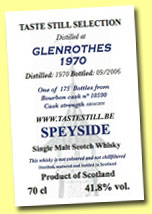 |
Glenrothes
1970/2006 (41.8%, Taste Still, cask
#10590, 175 bottles)
 From the rather impressive new series
from Corman Collins'. Colour: gold.
Nose: extremely fruity at first nosing,
not unlike an old Clynelish or Lochside.
Starts on all things orangey (juice,
jam, sweets) and lots of tangerines
as well as mangos and guavas. Even
hints of passion fruits. It gets then
more typically Glenrothes, with notes
of honey, beehive, wild flowers (buttercups
and dandelions). Huge notes of beeswax,
wax polish... Keeps developing on
whiffs of farmyard, orange cake, baklavas...
Also hints of incense, praline crème...
Classy stuff, for sure. Perfect balance,
the whole getting wilder after a while
(hints of clean wet dog, rabbit).
Also a little pepper. Hugely enjoyable.
From the rather impressive new series
from Corman Collins'. Colour: gold.
Nose: extremely fruity at first nosing,
not unlike an old Clynelish or Lochside.
Starts on all things orangey (juice,
jam, sweets) and lots of tangerines
as well as mangos and guavas. Even
hints of passion fruits. It gets then
more typically Glenrothes, with notes
of honey, beehive, wild flowers (buttercups
and dandelions). Huge notes of beeswax,
wax polish... Keeps developing on
whiffs of farmyard, orange cake, baklavas...
Also hints of incense, praline crème...
Classy stuff, for sure. Perfect balance,
the whole getting wilder after a while
(hints of clean wet dog, rabbit).
Also a little pepper. Hugely enjoyable.
|
| Mouth:
good news, it's not over-woody but
rather hugely honeyed, closer to a
typical old Glenrothes now. So we
have all kinds of honeys, crystallised
quince, dried pears, bananas and figs,
notes of cake, apple skin… The tannins
start to come through after a while,
making the whole nicely bitter but
not drying. Granted, it's not as expressive
as on the nose but no flaws here.
Gets a little tea-ish, though, with
also quite some cinnamon and vanilla,
but it is good. Finish: not too long
and probably a little drying now but
the fruitiness we had on the nose
is back, with quite some orange marmalade,
quince, kumquats… Quite some white
pepper as well. In short, it's a superb
old Glenrothes, even if the nose does
most of the job. Highly recommended.
90 points. |
Glenrothes
1979/2005 (55.2%, OB, cask #3808,
502 bottles)  Bottled at cask strength, which is
rather unusual at Glenrothes' if I'm
not mistaken. Colour: pale amber.
Nose: starts more spirity as expected,
with more varnish, even glue… This
one suffers from the comparison with
the 1970, for it's so rougher - even
slightly soapy. Yet, it gets then
unusually perfumy (roses, musk, scented
soap, incense again), all that in
an enjoyable way. Something vegetal
as well (asparagus). Hints of cardboard.
The whole is a bit strange, maybe
it's the high proof. Let's try it
with a little water: it gets wilder
now, more vegetal but also more complex,
maybe slightly peaty, waxy… Phenolic,
in any case.
Bottled at cask strength, which is
rather unusual at Glenrothes' if I'm
not mistaken. Colour: pale amber.
Nose: starts more spirity as expected,
with more varnish, even glue… This
one suffers from the comparison with
the 1970, for it's so rougher - even
slightly soapy. Yet, it gets then
unusually perfumy (roses, musk, scented
soap, incense again), all that in
an enjoyable way. Something vegetal
as well (asparagus). Hints of cardboard.
The whole is a bit strange, maybe
it's the high proof. Let's try it
with a little water: it gets wilder
now, more vegetal but also more complex,
maybe slightly peaty, waxy… Phenolic,
in any case. |
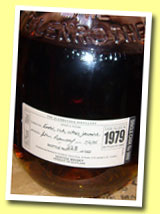 |
| Mouth
(neat): better, much better than on
the nose when undiluted. Very assertive
and unusually raw for a Glenrothes
(in a good way). Lots of roasted nuts,
caramel, toffee, with something very
vegetal and nicely bitter (bay leaves,
capers, radish). Then we have the
usual honey plus quite some mastic,
chlorophyll, infused tealeaves...
A different Glenrothes, more a hipflask
version than a club version. I like
it, it's got a little more to tell
you than the usual Glenrothes, no
matter how perfect their balance and
roundness is. Finish: very long, sweeter
now, still very honeyed but with again
a growing grassiness and something
phenolic if not peaty. I had it at
87-88 points but I must say its extra-dimension
(phenols and such) deserve a little
more. Okay, it's going to be 89
points, but this one needs
time. |
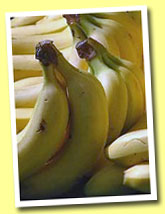 |
Glenrothes
33 yo 1972/2006 (56.6%, Signatory,
sherry butt #12368, 549 bottles)
 Colour: full gold. Nose: that's funny
(well), this one is kind of a blend
of both the 1970 and the 1979. First
we have a little of the 1979's roughness
but then it gets very fruity. Maybe
not as extravagantly so as the 1970
but we aren't that far. More on bananas
in fact, coconut, apples... Beautiful
waxiness, with also hints of fruity
olive oil, marzipan, hawthorn... Develops
on rubbed orange skin, fresh pineapple,
oriental pastries... Also argan oil,
roasted hazelnuts and, should we say
of course, lots of honey and pollen
together with great notes of pine
needles, moss and fresh mint. Really
complex and most enjoyable.
Colour: full gold. Nose: that's funny
(well), this one is kind of a blend
of both the 1970 and the 1979. First
we have a little of the 1979's roughness
but then it gets very fruity. Maybe
not as extravagantly so as the 1970
but we aren't that far. More on bananas
in fact, coconut, apples... Beautiful
waxiness, with also hints of fruity
olive oil, marzipan, hawthorn... Develops
on rubbed orange skin, fresh pineapple,
oriental pastries... Also argan oil,
roasted hazelnuts and, should we say
of course, lots of honey and pollen
together with great notes of pine
needles, moss and fresh mint. Really
complex and most enjoyable. |
| Mouth:
a superbly minty and resinous attack,
bold and 'wide' (does the peacock's
tail right away). Crystallised tangerines,
wax ala Clynelish, cloves, bananas,
passion fruits, pink grapefruits…
Also lots of spices (even more cloves,
black pepper, paprika). It does calm
down after a moment, getting more
classically honeyed and 'caky'. Also
quite some orange liqueur (triple-sec).
Lots of oomph considering its age,
I guess little people would tell you
it's almost 35 yo when tasting it blind.
Finish: long, fruity, nervous… A tad
drying of course (it's 35 yo ) but also
slightly salty. Assertive indeed and
amazingly young. 88 points. |
| MUSIC
– Recommended
listening: WF favourite Regina
Spektor singing I
need your love.mp3 (from 'Soviet
Kitsch'). Quite beautiful, with all
these violins (huge market for used
violins and cellos these days). Please
buy Regina Spektor's music... |
 |
| |
February
1, 2007 |
|
 |
| Not
only has the brand new MM
Matrix finally been published,
we also managed to get MM#101
ready just two weeks after we
published the previous issue.
That must be a new record! |
|
| PETE
McPEAT AND JACK WASHBACK |
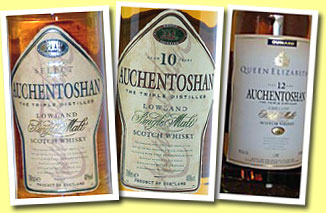 |
TASTING
- THREE AUCHENTOSHANS |
Auchentoshan
‘Select’ (40%, OB, circa
2006)  Colour: white wine. Nose: grainy and
vegetal at first nosing (newly cut
grass), with also notes of lavender
and pear. May be mistaken for vodka
but it’s actually pretty flawless.
Just not really interesting. Mouth:
light and grainy, sweet, very discreet
indeed. Not much happening but again,
that means there’s no serious
flaws either. Finish: short, maybe
a tad salty but still very grainy.
Reminds me of Zubrovska, actually.
Serve chilled. 70 points.
Colour: white wine. Nose: grainy and
vegetal at first nosing (newly cut
grass), with also notes of lavender
and pear. May be mistaken for vodka
but it’s actually pretty flawless.
Just not really interesting. Mouth:
light and grainy, sweet, very discreet
indeed. Not much happening but again,
that means there’s no serious
flaws either. Finish: short, maybe
a tad salty but still very grainy.
Reminds me of Zubrovska, actually.
Serve chilled. 70 points.
Auchentoshan
10 yo (40%, OB, circa 2006)
 Colour: straw. Nose: much more wood
and caramel influence. Quite some
vanilla crème as well as hints
of orange juice and violet perfume.
Otherwise it’s quite bland and
I must say I like the Select’s
‘full nudity’ better.
Mouth: things are improving now, there’s
certainly more body than in the select.
Alas, the caramelly notes are too
strong and I feel the spirit doesn’t
really stand that. Lots of cereals
and nuts as well, something toasted
(cake)… Finish: quite short
but longer than the Select’s,
still very caramelly but also a little
tannic. Maybe a little substandard,
if I may say so. 70 points.
Colour: straw. Nose: much more wood
and caramel influence. Quite some
vanilla crème as well as hints
of orange juice and violet perfume.
Otherwise it’s quite bland and
I must say I like the Select’s
‘full nudity’ better.
Mouth: things are improving now, there’s
certainly more body than in the select.
Alas, the caramelly notes are too
strong and I feel the spirit doesn’t
really stand that. Lots of cereals
and nuts as well, something toasted
(cake)… Finish: quite short
but longer than the Select’s,
still very caramelly but also a little
tannic. Maybe a little substandard,
if I may say so. 70 points.
Auchentoshan
12 yo ‘QE2’ (43%, OB for
Cunard, 100cl, circa 2006?)  This comes from left over stocks from
Cunard’s liner Queen Elizabeth
II. Colour: pale gold. Nose: much
nicer now, the oak is much nicer,
there are whiffs of mint and earl
grey tea, kumquats, roots… Really
a, err… nice one. Mouth: the
same is happening here, it’s
much livelier than the 10 yo . Enjoyable
oakiness, notes of liquorice, a little
orange water (baklavas), orange marmalade,
praline, dried lychees. Good, for
sure. Finish: also longer, candied,
nutty, with quite some tannins…
An Auchentoshan ‘retour des
Indes’? Lucky cruise passengers,
they were spoilt… 79
points.
This comes from left over stocks from
Cunard’s liner Queen Elizabeth
II. Colour: pale gold. Nose: much
nicer now, the oak is much nicer,
there are whiffs of mint and earl
grey tea, kumquats, roots… Really
a, err… nice one. Mouth: the
same is happening here, it’s
much livelier than the 10 yo . Enjoyable
oakiness, notes of liquorice, a little
orange water (baklavas), orange marmalade,
praline, dried lychees. Good, for
sure. Finish: also longer, candied,
nutty, with quite some tannins…
An Auchentoshan ‘retour des
Indes’? Lucky cruise passengers,
they were spoilt… 79
points. |
| MUSIC
– Recommended
listening: lots of sweet romantic
tunes on WF these days (but there
will be more rock and roll soon!).
So, today it's Joshua
Radin with Schuyler
Fisk singing Paperweight.mp3.
Isn't that cool? Please buy Josh and
Schuyler's musics. |
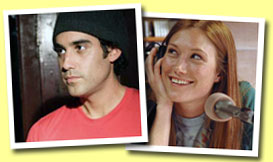 |
Check
the index of all entries:
Whisky
Music
Nick's Concert
Reviews |
 |
 |
 |
|
| |
Best
malts I had these weeks - 90+
points only - alphabetical:
Caol
Ila 36 yo 1965/2002 (45.6%,
Gordon & MacPhail Private Collection, cask
#4211)
Glen
Garioch 1971 (43%, OB for Oddbins,
mid-1990’s)
Glen
Garioch 21 yo 1965 (43%, OB, circa 1986)
Glen
Garioch 21 yo 1965 (50%, OB, circa 1986)
Glen
Garioch 21 yo 1965 (57%, OB, circa 1986)
Glen
Garioch 29 yo 1968 (56.5%, OB for Bill
& Maggie Miller, hogshead #13)
Glenrothes
1970/2006 (41.8%, Taste Still, cask
#10590, 175 bottles)
Highland
Park 1959/1991 (57.6%, Gordon &
MacPhail ‘Cask’, cask #598)
Highland
Park 1955/1989 (54.6%, Gordon &
MacPhail ‘Cask’ for Meregalli)
Laphroaig
15 yo 1991/2006 (53.7%, Signatory, cask
#6981, 212 bottles)
Laphroaig
1977/1999 (43%, Berry Bros, Cask #5081)
Laphroaig
1967/1993 (50.3%, Signatory for Werner
Hertwig, private bottling)


|
| |
|
|



